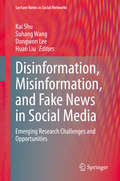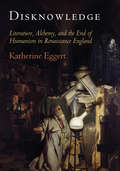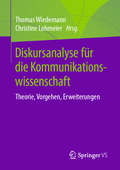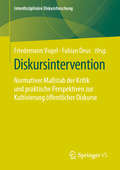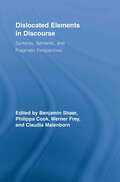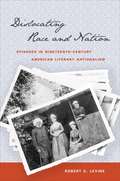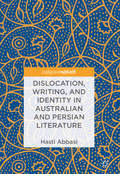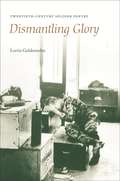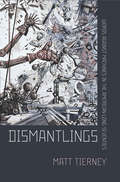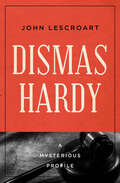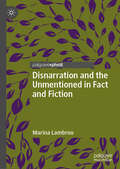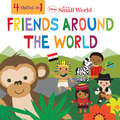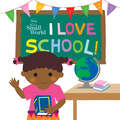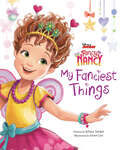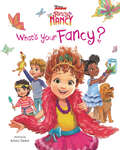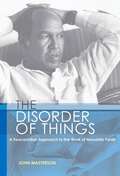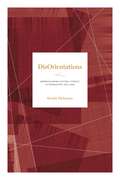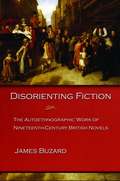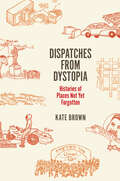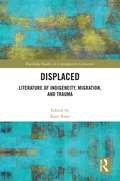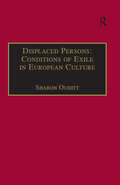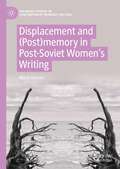- Table View
- List View
Disinformation, Misinformation, and Fake News in Social Media: Emerging Research Challenges and Opportunities (Lecture Notes in Social Networks)
by Kai Shu Suhang Wang Dongwon Lee Huan LiuThis book serves as a convenient entry point for researchers, practitioners, and students to understand the problems and challenges, learn state-of-the-art solutions for their specific needs, and quickly identify new research problems in their domains. The contributors to this volume describe the recent advancements in three related parts: (1) user engagements in the dissemination of information disorder; (2) techniques on detecting and mitigating disinformation; and (3) trending issues such as ethics, blockchain, clickbaits, etc. This edited volume will appeal to students, researchers, and professionals working on disinformation, misinformation and fake news in social media from a unique lens.
Disknowledge
by Katherine Eggert"Disknowledge": knowing something isn't true, but believing it anyway. In Disknowledge: Literature, Alchemy, and the End of Humanism in Renaissance England, Katherine Eggert explores the crumbling state of learning in the sixteenth and seventeenth centuries. Even as the shortcomings of Renaissance humanism became plain to see, many intellectuals of the age had little choice but to treat their familiar knowledge systems as though they still held. Humanism thus came to share the status of alchemy: a way of thinking simultaneously productive and suspect, reasonable and wrongheaded.Eggert argues that English writers used alchemy to signal how to avoid or camouflage pressing but discomfiting topics in an age of rapid intellectual change. Disknowledge describes how John Donne, George Herbert, Henry Vaughan, John Dee, Christopher Marlowe, William Harvey, Helkiah Crooke, Edmund Spenser, and William Shakespeare used alchemical imagery, rhetoric, and habits of thought to shunt aside three difficult questions: how theories of matter shared their physics with Roman Catholic transubstantiation; how Christian Hermeticism depended on Jewish Kabbalah; and how new anatomical learning acknowledged women's role in human reproduction. Disknowledge further shows how Shakespeare, Ben Jonson, and Margaret Cavendish used the language of alchemy to castigate humanism for its blind spots and to invent a new, posthumanist mode of knowledge: writing fiction.Covering a wide range of authors and topics, Disknowledge is the first book to analyze how English Renaissance literature employed alchemy to probe the nature and limits of learning. The concept of disknowledge--willfully adhering to something we know is wrong--resonates across literary and cultural studies as an urgent issue of our own era.
Diskursanalyse für die Kommunikationswissenschaft: Theorie, Vorgehen, Erweiterungen
by Thomas Wiedemann Christine LohmeierDie Diskursanalyse kann einen signifikanten Beitrag zur Kommunikationswissenschaft und zur sozialwissenschaftlichen Medienforschung leisten. Der Sammelband stellt grundlegende theoretische Positionen dar, diskutiert analytische Vorgehensweisen mit unterschiedlichem Datenmaterial, präsentiert empirische Forschungsbefunde und fragt nach künftigen Perspektiven sowie Erweiterungsmöglichkeiten diskursanalytischer Verfahren. Der Band liefert eine aktuelle Bestandsaufnahme in Sachen Diskursanalyse aus verschiedenen Disziplinen und plädiert für eine stärkere Integration dieser Forschungstradition in die Kommunikationswissenschaft.
Diskursintervention: Normativer Maßstab der Kritik und praktische Perspektiven zur Kultivierung öffentlicher Diskurse (Interdisziplinäre Diskursforschung)
by Friedemann Vogel Fabian DeusDie Diskursforschung kann einen wertvollen Beitrag zur Kultivierung öffentlicher, demokratischer Debatten leisten. Die pointierten Kurzbeiträge dieses Bandes diskutieren etablierte und neue Formen, theoretische Möglichkeiten und praktische Grenzen wissenschaftlicher Diskursintervention. Im Fokus stehen die drei folgenden Fragen: Darf, muss und kann das Intervenieren in öffentliche Debatten eine wissenschaftliche Aufgabe sein? Auf welche normativen Maßstäbe kann sich ein wissenschaftliches oder journalistisches Eingreifen in Diskurse legitimerweise berufen? Wie können Diskursforschende und Medienschaffende jenseits ihrer Domänen zu einer Aufklärung strategischer Kommunikation und für eine Waffengleichheit auf dem diskursiven Schlachtfeld der Gesellschaft beitragen?
Dislocated Elements in Discourse: Syntactic, Semantic, and Pragmatic Perspectives (Routledge Studies in Germanic Linguistics)
by Benjamin Shaer Philippa Cook Werner Frey Claudia MaienbornThis volume is about 'dislocation' – the removal of phrases from their canonical positions in a sentence to its left or right edge. Dislocation encompasses a wide range of linguistic phenomena, related to nominal and adverbial expressions and to the information structuring notions of topic and focus; and takes intriguingly different forms across languages. This book reveals some of the empirical richness of dislocation and some key puzzles related to its syntactic, semantic, and discourse analysis.
Dislocating Race and Nation
by Robert S. LevineAmerican literary nationalism is traditionally understood as a cohesive literary tradition developed in the newly independent United States that emphasized the unique features of America and consciously differentiated American literature from British literature. Robert S. Levine challenges this assessment by exploring the conflicted, multiracial, and contingent dimensions present in the works of late eighteenth- and nineteenth-century American and African American writers. Conflict and uncertainty, not consensus, Levine argues, helped define American literary nationalism during this period. Levine emphasizes the centrality of both inter- and intra-American conflict in his analysis of four illuminating "episodes" of literary responses to questions of U.S. racial nationalism and imperialism. He examines Charles Brockden Brown and the Louisiana Purchase; David Walker and the debates on the Missouri Compromise; Nathaniel Hawthorne, Herman Melville, and Hannah Crafts and the blood-based literary nationalism and expansionism of the mid-nineteenth century; and Frederick Douglass and his approximately forty-year interest in Haiti. Levine offers critiques of recent developments in whiteness and imperialism studies, arguing that a renewed attention to the place of contingency in American literary history helps us to better understand and learn from writers trying to make sense of their own historical moments.
Dislocation, Writing, and Identity in Australian and Persian Literature
by Hasti AbbasiThis study aims to foreground key literary works in Persian and Australian culture that deal with the representation of exile and dislocation. Through cultural and literary analysis, Dislocation, Writing, and Identity in Australian and Persian Literature investigates the influence of dislocation on self-perception and the remaking of connections both through the act of writing and the attempt to transcend social conventions. Examining writing and identity in David Malouf’s An Imaginary Life (1978), Iranian Diaspora Literature, and Shahrnush Parsipur’s Women Without Men (1989/ Eng.1998), Hasti Abbasi provides a literary analysis of dislocation, with its social and psychological manifestations. Abbasi reveals how the exploration of exile/dislocation, as a narrative that needs to be investigated through imagination and meditation, provides a mechanism for creative writing practice.
Dismantling Glory: Twentieth-century Soldier Poetry
by Lorrie GoldensohnDismantling Glory presents the most personal and powerful words ever written about the horrors of battle, by the very soldiers who put their lives on the line. Focusing on American and English poetry from World War I, World War II, and the Vietnam War, Lorrie Goldensohn, a poet and pacifist, affirms that by and large, twentieth-century war poetry is fundamentally antiwar. She examines the changing nature of the war lyric and takes on the literary thinking of two countries separated by their common language.World War I poets such as Wilfred Owen emphasized the role of soldier as victim. By World War II, however, English and American poets, influenced by the leftist politics of W. H. Auden, tended to indict the whole of society, not just its leaders, for militarism. During the Vietnam War, soldier poets accepted themselves as both victims and perpetrators of war's misdeeds, writing a nontraditional, more personally candid war poetry.The book not only discusses the poetry of trench warfare but also shows how the lives of civilians—women and children in particular—entered a global war poetry dominated by air power, invasion, and occupation. Goldensohn argues that World War II blurred the boundaries between battleground and home front, thus bringing women and civilians into war discourse as never before. She discusses the interplay of fascination and disapproval in the texts of twentieth-century war and notes the way in which homage to war hero and victim contends with revulsion at war's horror and waste.In addition to placing the war lyric in literary and historical context, the book discusses in detail individual poets such as Wilfred Owen, W. H. Auden, Keith Douglas, Randall Jarrell, and a group of poets from the Vietnam War, including W. D. Ehrhart, Bruce Weigl, Yusef Komunyakaa, David Huddle, and Doug Anderson.Dismantling Glory is an original and compelling look at the way twentieth-century war poetry posited new relations between masculinity and war, changed and complicated the representation of war, and expanded the scope of antiwar thinking.
Dismantling Glory
by Lorrie GoldensohnDismantling Glory deals with the poetry written about the honors and horrors of battle by the very soldiers who put their lives on the line. Focusing on American and English poetry from World Wars I and II and the Vietnam War, Lorrie Goldensohn presents the move from a poetry largely bound to trench warfare to a global war poetry dominated by air power, invasion, and occupation. Civilians, prisoners, and children enter this poetry in new and compelling ways, as do issues of race and gender, changing and complicating the representation of war, and expanding the scope of antiwar thinking.
Dismantlings: Words against Machines in the American Long Seventies
by Matt Tierney"For the master's tools," the poet Audre Lorde wrote, "will never dismantle the master's house." Dismantlings is a study of literary, political, and philosophical critiques of the utopian claims about technology in the Long Seventies, the decade and a half before 1980. Following Alice Hilton's 1963 admonition that the coming years would bring humanity to a crossroads—"machines for HUMAN BEINGS or human beings for THE MACHINE"—Matt Tierney explores wide-ranging ideas from science fiction, avant-garde literatures, feminist and anti-racist activism, and indigenous eco-philosophy that may yet challenge machines of war, control, and oppression.Dismantlings opposes the language of technological idealism with radical thought of the Long Seventies, from Lorde and Hilton to Samuel R. Delany and Ursula K. Le Guin to Huey P. Newton, John Mohawk, and many others. This counter-lexicon retrieves seven terms for the contemporary critique of technology: Luddism, a verbal and material combat against exploitative machines; communion, a kind of togetherness that stands apart from communication networks; cyberculture, a historical conjunction of automation with racist and militarist machines; distortion, a transformative mode of reading and writing; revolutionary suicide, a willful submission to the risk of political engagement; liberation technology, a synthesis of appropriate technology and liberation theology; and thanatopography, a mapping of planetary technological ethics after Auschwitz and Hiroshima. Dismantlings restores revolutionary language of the radical Long Seventies for reuse in the digital present against emergent technologies of exploitation, subjugation, and death.
Dismas Hardy: A Mysterious Profile (Mysterious Profiles)
by John LescroartThe New York Times–bestselling author tells the story of how he created his popular San Francisco sleuth.In 1989, everyman Dismas Hardy debuted in John Lescroart’s mystery, Dead Irish. It’s a story millions of readers have enjoyed, along with other entries in the New York Times–bestselling series. But a tale they may not know is how Lescroat invented the ex-Marine, ex-cop, and ex-lawyer turned sleuth.In this brief autobiographical essay, Lescroart details the development of Dismas Hardy, as well as his own career. He discusses his attempt to be a “serious” novelist, his stint as the lead singer of a band, and his struggle to get published. He also talks about how he realized he was meant to be a writer (and not working a “regular” nine-to-five) and how Dismas’s adventures almost didn’t become the series readers love.Praise for the Dismas Hardy Novels“Compulsively readable . . . a dense and involving saga of big-city crime and punishment.” —San Francisco Chronicle“A beautifully written San Francisco murder story with perfect-pitch dialogue.” —Playboy on Dead Irish “The killer proves to be as fascinating a personality as Hardy himself.” —Publishers Weekly on Dead Irish“The narrative flows effortlessly and includes a Perry Mason–worthy moment when Hardy manifests a bit of courtroom magic. Lescroart is a perfect choice for readers who enjoy great ensemble casts.” —Booklist on Poison
Disnarration and the Unmentioned in Fact and Fiction
by Marina LambrouIn this book Marina Lambrou explores the dimension of narrative storytelling described as ‘the disnarrated’ – events that do not happen but which are referred to – across three genres of texts: personal narratives; news stories; and fiction (literary and film). The book begins by asking why such disnarrated narratives are nevertheless considered tellable. It moves on to examine the pervasiveness of this phenomenon in news reports about “near misses” and the shared personal narratives about dangerous experiences, where “truth” is expected to be central their telling. It further discusses how disnarration is generated in counterfactual “what if?” scenarios in fiction where characters follow alternative, forked paths with fascinating unexpected consequences. This engaging work offers original insights to anyone interested in storytelling and will appeal in particular to scholars of language and literature, stylistics, narratology, media, film and journalism.
Disney It's A Small World: Friends Around the World
by Disney PressLearn to say "Hello" and "I Love You" in languages from across the globe and meet animals from many different countries in this colorful book inspired by the Disney theme park attraction!
Disney It's A Small World: I Love School!
by Disney PressWhat if you could spend the morning in China learning about history, then hop on a plane to South Africa for music class? Or maybe you could play tag in Italy at recess, then travel to America and practice spelling! It’s easy to learn and play around the world—just look inside! With new friends Andrew, Ling, Zanele, and Dario, school has never been more fun.
Disney Junior Fancy Nancy: My Fanciest Things (Disney Junior Fancy Nancy)
by Krista TuckerOoh la la! Nancy loves all of the fancy things in her room—like the fabulous tutu she wore at her dance recital, her exquisite tea set, and the magnifique vanity table that once belonged to her grandmother. But Nancy will soon discover that there’s something extra special that Nancy’s fanciest things all have in common…Disney Junior’s Fancy Nancy: My Fanciest Things is a brand-new picture book with gorgeous watercolor art by Grace Lee and a heartwarming original story, based on the animated show and inspired by the classic picture book series.Disney Junior’s Fancy Nancy is an animated family comedy starring six-year-old Nancy, a girl who is fancy in everything from her advanced vocabulary to her creative, elaborate attire. The show is based on the New York Times bestselling book series Fancy Nancy by Jane O’Connor and Robin Preiss Glasser.
Disney Junior Fancy Nancy: What's Your Fancy? (Disney Junior Fancy Nancy)
by Krista TuckerBased on the Disney Junior TV show and inspired by the classic picture book series, this is a brand-new, beautifully illustrated picture book that’s perfect for sharing with the Fancy Nancy fan in your life!Nancy knows that everyone has his or her own way of being fancy. It’s part of what makes us unique. But Nancy is curious to know what makes her family and friends feel fancy, so she goes to find out. Nancy is happy to know that—while she has her own way of being fancy—everyone else does too. These different expressions of fanciness are what make life so magnifique! Disney Junior’s Fancy Nancy is an animated children’s series starring six-year-old Nancy, a girl who is fancy in everything from her advanced vocabulary to her creative, elaborate attire. The show is based on the New York Times bestselling book series Fancy Nancy by Jane O’Connor and illustrated by Robin Preiss Glasser
The Disorder of Things: A Foucauldian approach to the work of Nuruddin Farah
by John MastersonNuruddin Farah is widely regarded as one of the most sophisticated voices in contemporary world literature. Michel Foucault is revered as one of the most important thinkers of the twentieth century, with his discursive legacy providing inspiration for scholars working in a range of interdisciplinary fields. The Disorder of Things offers a reading of the Somali novelist through the prism of the French philosopher. The book argues that the preoccupations that have remained central throughout Farah’s forty year career, including political autocracy, female infibulation, border conflicts, international aid and development, civil war, transnational migration and the Horn of Africa’s place in a so-called ‘axis of evil’, can be mapped onto some key concerns in Foucault’s writing most notably Foucault’s theoretical turn from ‘disciplinary’ to ‘biopolitical’ power. In both the colonial past and the postcolonial present, Somalia is typically represented as an incubator of disorder: whether in relation to internecine conflict, international terrorism or contemporary piracy. Through his work, both fictional and non-fictional, Farah strives to present alternative stories to an expanding global readership. The Disorder of Things analyses the politics and poetics that underpin this literary project, beginning with Farah’s first fictional cycle, Variations on the Theme of an African Dictatorship (1979-1983), and ending with his Past Imperfect trilogy (2004-2011). Farah’s writing calls for a more refined, substantial reading of our current geo-political situation. As such, it both warrants and compels the kind of critical engagement foregrounded throughout The Disorder of Things. This book will appeal to students, academics and general readers with an interest in the interdisciplinary study of literature. Its engagement with theorists, drawn from postcolonial, feminist and development studies, set against the backdrop of a host of philosophical and sociological discourses, shows how such intellectual cross-fertilisation can enliven a single-author study.
DisOrientations: German-Turkish Cultural Contact in Translation, 1811-1946 (Max Kade Research Institute: Germans Beyond Europe #15)
by Kristin DickinsonThe fields of comparative and world literature tend to have a unidirectional, Eurocentric focus, with attention to concepts of "origin" and "arrival." DisOrientations challenges this viewpoint. Kristin Dickinson employs a unique multilingual archive of German and Turkish translated texts from the early nineteenth through the mid-twentieth century. In this analysis, she reveals the omnidirectional and transtemporal movements of translations, which, she argues, harbor the disorienting potential to reconfigure the relationships of original to translation, past to present, and West to East. Through the work of three key figures—Johann Wolfgang von Goethe, Friedrich Schrader, and Sabahattin Ali—Dickinson develops a concept of translational orientation as a mode of omnidirectional encounter. She sheds light on translations that are not bound by the terms of economic imperialism, Orientalism, or Westernization, focusing on case studies that work against the basic premises of containment and originality that undergird Orientalism’s system of discursive knowledge production. By linking literary traditions across retroactively applied periodizations, the translations examined in this book act as points of connection that produce new directionalities and open new configurations of a future German-Turkish relationship.Groundbreaking and erudite, DisOrientations examines literary translation as a complex mode of cultural, political, and linguistic orientation. This book will appeal to scholars and students of translation theory, comparative literature, Orientalism, and the history of German-Turkish cultural relations.
DisOrientations: German-Turkish Cultural Contact in Translation, 1811-1946 (Max Kade Research Institute)
by Kristin DickinsonThe fields of comparative and world literature tend to have a unidirectional, Eurocentric focus, with attention to concepts of “origin” and “arrival.” DisOrientations challenges this viewpoint. Kristin Dickinson employs a unique multilingual archive of German and Turkish translated texts from the early nineteenth through the mid-twentieth century. In this analysis, she reveals the omnidirectional and transtemporal movements of translations, which, she argues, harbor the disorienting potential to reconfigure the relationships of original to translation, past to present, and West to East. Through the work of three key figures—Johann Wolfgang von Goethe, Friedrich Schrader, and Sabahattin Ali—Dickinson develops a concept of translational orientation as a mode of omnidirectional encounter. She sheds light on translations that are not bound by the terms of economic imperialism, Orientalism, or Westernization, focusing on case studies that work against the basic premises of containment and originality that undergird Orientalism’s system of discursive knowledge production. By linking literary traditions across retroactively applied periodizations, the translations examined in this book act as points of connection that produce new directionalities and open new configurations of a future German-Turkish relationship.Groundbreaking and erudite, DisOrientations examines literary translation as a complex mode of cultural, political, and linguistic orientation. This book will appeal to scholars and students of translation theory, comparative literature, Orientalism, and the history of German-Turkish cultural relations.
Disorienting Fiction: The Autoethnographic Work of Nineteenth-Century British Novels
by James BuzardThis book gives an ambitious revisionist account of the nineteenth-century British novel and its role in the complex historical process that ultimately gave rise to modern anthropology's concept of culture and its accredited researcher, the Participant Observer. Buzard reads the great nineteenth-century novels of Charles Dickens, Charlotte Brontë, George Eliot, and others as "metropolitan autoethnographies" that began to exercise and test the ethnographic imagination decades in advance of formal modern ethnography--and that did so while focusing on Western European rather than on distant Oriental subjects. Disorienting Fiction shows how English Victorian novels appropriated and anglicized an autoethnographic mode of fiction developed early in the nineteenth century by the Irish authors of the National Tale and, most influentially, by Walter Scott. Buzard demonstrates that whereas the fiction of these non-English British subjects devoted itself to describing and defending (but also inventing) the cultural autonomy of peripheral regions, the English novels that followed them worked to imagine limited and mappable versions of English or British culture in reaction against the potential evacuation of cultural distinctiveness threatened by Britain's own commercial and imperial expansion. These latter novels attempted to forestall the self-incurred liabilities of a nation whose unprecedented reach and power tempted it to universalize and export its own customs, to treat them as simply equivalent to a globally applicable civilization. For many Victorian novelists, a nation facing the prospect of being able to go and to exercise its influence just about anywhere in the world also faced the danger of turning itself into a cultural nowhere. The complex autoethnographic work of nineteenth-century British novels was thus a labor to disorient or de-globalize British national imaginings, and novelists mobilized and freighted with new significance some basic elements of prose narrative in their efforts to write British culture into being. Sure to provoke debate, this book offers a commanding reassessment of a major moment in the history of British literature.
Disowning Knowledge: In Seven Plays of Shakespeare
by Stanley CavellReissued with a new essay on Macbeth this famous collection of essays on Shakespeare's tragedies considers these plays as responses to the crisis of knowledge and the emergence of modern skepticism provoked by the new science of the late sixteenth and early seventeenth centuries.
Dispatches from Dystopia: Histories of Places Not Yet Forgotten
by Kate BrownWhy are Kazakhstan and Montana the same place? asks one chapter of Kate Brown s surprising and unusual journey into the histories of places on the margins, overlooked or erased. It turns out that a ruined mining town in Kazakhstan and Butte, Montana America s largest environmental Superfund site have much more in common than one would think thanks to similarities in climate, hucksterism, and the perseverance of their few hardy inhabitants. Taking readers to these and other unlikely locales, "Dispatches from Dystopia" delves into the very human and sometimes very fraught ways we come to understand a particular place, its people, and its history. In "Dispatches from Dystopia, " Brown wanders the Chernobyl Zone of Alienation, first on the Internet and then in person, to figure out which version the real or the virtual is the actual forgery. She also takes us to the basement of a hotel in Seattle to examine the personal possessions left in storage by Japanese-Americans on their way to internment camps in 1942. In Uman, Ukraine, we hide with Brown in a tree in order to witness the annual male-only Rosh Hashanah celebration of Hasidic Jews. In the Russian southern Urals, she speaks with the citizens of the small city of Kyshtym, where invisible radioactive pollutants have mysteriously blighted lives. Finally, Brown returns home to Elgin, Illinois, in the midwestern industrial rust belt to investigate the rise of rustalgia andthe waysher formative experiences have inspired her obsession with modernist wastelands. "Dispatches from Dystopia" powerfully and movingly narrates the histories of locales that have been silenced, broken, or contaminated. In telling these previously unknown stories, Brown examines the making and unmaking of place, and the lives of the people who remain in the fragile landscapes that are left behind. "
Displaced: Literature of Indigeneity, Migration, and Trauma (Routledge Studies in Contemporary Literature)
by Kate RoseThrough specific and rigorous analysis of contemporary literary texts, this book shows how writers from inside effected communities portray indigeneity, displacement, and trauma. In a world of increasing global inequality, this study aims to demonstrate how literature, and the study of it, can effect positive social change, notably in the face of global environmental, economic, and social injustice. This collection brings together a diverse and compelling array of voices from academics leading their fields around the world, to pioneer a new approach to literary analysis anchored in engagement with our changing world.
Displaced Persons: Conditions of Exile in European Culture (Studies in European Cultural Transition #14)
by Sharon OudittThis lively and intellectually vigorous conspectus of studies approaches the subject of exile from a variety of disciplinary perspectives. The contributions to this volume give due attention to the twentieth century migratory phenomena, theorised by Edward Said, Julia Kristeva and Salman Rushdie. They also show that the discourse and experience of exile is not the stuff of modernity alone. The volume illustrates that the waning of the Middle Ages, Reformation and Restoration politics, and the importation of Egyptian mummies into a nineteenth-century England hungry for imperial exotica reveal displacement, dislocation, otherness and the uncanniness of observing strangers-on-display to have long been part of European cultural currency. The essays range across a variety of disciplines: literary studies, modern languages, history of science, philosophy and museum studies.
Displacement and (Palgrave Studies in Contemporary Women’s Writing)
by Marja SorvariThe book examines prominent literary works from the past two decades by Russian women writers dealing with the Soviet past. It explores works such as Daniel Stein, Interpreter by Ludmilla Ulitskaya, The Time of Women by Elena Chizhova, Secondhand Time: The Last of the Soviets by Svetlana Alexievich, and In Memory of Memory by Maria Stepanova, and uncovers connecting thematic structures and features. Focusing on the concepts of displacement and postmemory, the book shows how these works have given voice to those on the margins of society and of ‘great history’ whose resistance was often silent. In doing so, these women writers portray the everyday experiences and trauma of displaced women and girls during the second half of the twentieth century. This study offers new insights into the importance of these women writers’ work in creating and preserving cultural memory in post-Soviet Russia.
